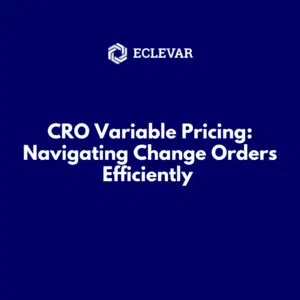With the progression of clinical trials, sponsors are increasingly turning to contract research organizations (CROs) for their specialized expertise in efficient and resourceful allocation. Nonetheless, not all CROs possess equal qualities.
Therefore, an essential aspect to evaluate when selecting a fitting one is its pricing structure. Biopharma/biotech sponsors face significant financial expenses starting and maintaining these trials making it necessary that they choose a CRO whose cost model can ease this burden.
As you consider outsourcing a clinical trial to an experienced CRO, it may be challenging to determine the most cost-efficient and practical approach.
This article will explore why sponsors are increasingly favoring transparent pricing over variable approaches for achieving affordability.
Pricing Models for Conventional CROs
Although traditional cost models continue to be prevalent, larger CROs tend to rely on them more heavily. The most basic pricing model is the Time and Materials (T&M) contract which involves fixed labor rates for employee time spent along with unit rates for material costs.
Nevertheless, due to the intricate nature of clinical trials as dynamic projects, various CROs such as PPD and IQVIA choose alternate variable pricing schemes when billing sponsors.
The full-time equivalent (FTE), also known as variable pricing, operates at a per-hour rate that is charged to the sponsor based on the number of hours their staff work for a specific project. However, this approach frequently leads to unexpected cost increases due to various factors such as regulatory changes or site-related issues during clinical trials.
These shifts in scope cause expenses associated with the project gradually escalate over time leaving sponsors faced with mounting costs.
What Change Orders are?
It has been determined that clinical trials are not fixed projects, making it difficult to account for unexpected changes within the contract. Change Orders were created as a solution to this issue – they serve as an official amendment between the sponsor and CRO when there is a shift or expansion in trial scope.
While variable pricing and change orders make sense theoretically because they allow for itemized expenses, their implementation often proves frustrating due to certain limitations.
Reducing Interference in the Efficiency of Clinical Trials
Change Orders inherently cause CROs to pause running a sponsor’s study to reallocate resources, evaluate costs and obtain necessary approvals. As projects shift – as is common with trials- these change orders become bureaucratic hindrances that impede the goal of sponsors to meet targets efficiently. In clinical research where time means money, this interruption can result not only in delays but also substantial financial losses for each day lost towards restructuring contracts.
Another comparable trap is that a lot of suppliers may secure the project by submitting lower bids initially. Nonetheless, when change orders come into play, the final cost for conducting a clinical trial might surpass what was estimated by the sponsor. Furthermore, there exists an implicit obscurity between sponsors and CROs concerning both parties’ expectations and overall expenses related to any project.
When CROs provide pricing based on variables rather than transparency or affordability in their services, it leads to unpredictability as well as long-term friction among involved parties.
Pricing Models for CRO Services
There are alternative pricing models available besides T&M and FTE contracts. Fixed-fee pricing answers the obstacles present in fluctuating cost structures by charging a predetermined, all-inclusive flat rate to sponsors for trial services provided. Unlike their bigger counterparts, contemporary CROs such as Eclevar CRO do not employ variable pricing at all. Instead, they solely offer fixed-fee arrangements for customer convenience.
Fixed-fee Pricing Can Yield Advantages
Primarily, utilizing fixed-fee CRO pricing models is a more straightforward approach that promotes the effective allocation of time and resources for conducting clinical trials on behalf of sponsors. This results in projects remaining within their assigned budget, while allowing the trial team to dedicate ample attention towards study execution rather than negotiation endeavors. Ultimately, this type of pricing structure breeds greater transparency and trust between both parties involved–encouraging stronger partnerships founded on balanced risk and reward stakes shared by both the sponsor and CRO alike.
Connect with Eclevar today and discover how a tech-enabled full-service CRO can effectively innovate trial management processes at affordable rates around the globe.









